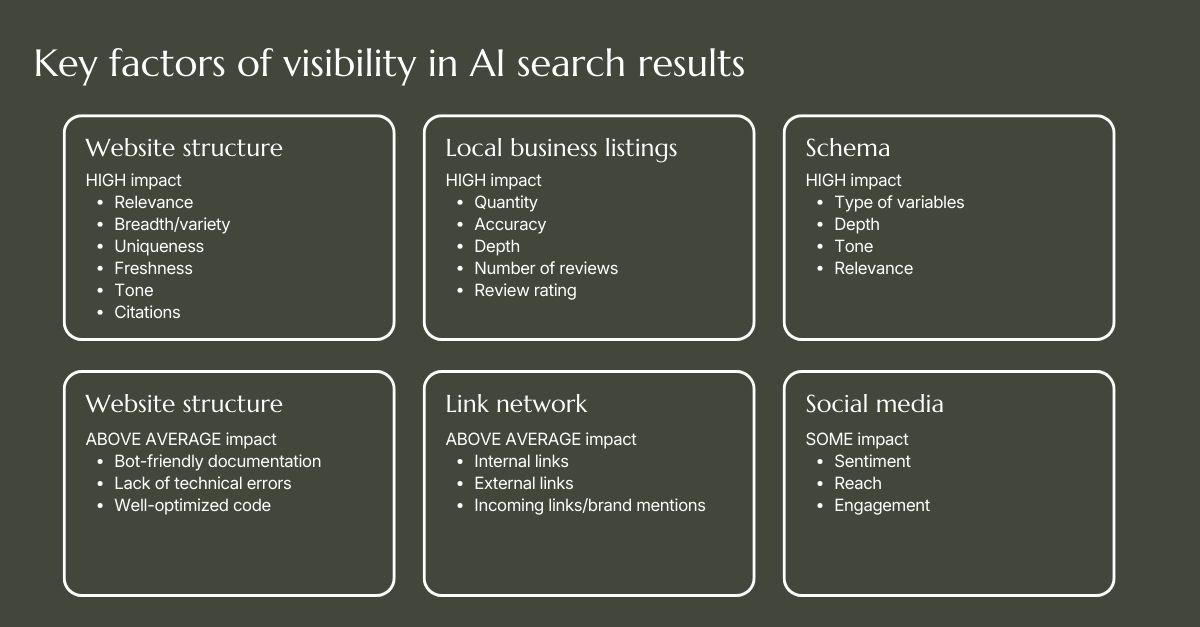AI doesn’t rank hotels. It learns which ones to trust.
In our last post, "Why AI visibility ultimately collapses back to data", we made the case that AI visibility ultimately collapses back to data.
That idea challenges a lot of current thinking. It reframes AI discovery as something earned over time rather than optimized into existence through prompts, schema, or surface-level tactics.
But it naturally raises a more important question:
If AI systems infer visibility from data, what does brand authority actually look like in an AI-driven travel market?
Authority is inferred, not declared
Hotels don’t tell AI systems that they are authoritative. AI systems infer authority from patterns.
Those patterns are built over time and reinforced across many signals:
- How consistently a hotel shows up
- How often travelers choose it
- How reliably it delivers on expectations
- How well its signals align across platforms
In an AI-driven world, authority isn’t a claim. It’s a pattern that emerges when data agrees.
A single strong signal can’t carry authority on its own. If engagement says one thing, availability says another, and pricing or reputation contradicts both, AI hesitates. And hesitation reduces visibility.
We’ve been here before
This isn’t the first time marketers have gone through a shift like this.
When Google first introduced PageRank, it fundamentally changed how visibility was earned. Ranking wasn’t determined by how many times a keyword appeared on a page. It wasn’t even primarily about how well-written a website was. It was about signals of credibility and relevance across the broader web.
Many people tried to game that system through keyword stuffing, link schemes, and other shortcuts. Some of those tactics worked temporarily. Most didn’t last.
What ultimately mattered was whether a site was referenced, trusted, and reinforced by other credible sources over time.
In many ways, we’ve come full circle.
The difference now is that visibility is no longer centered on a single website. AI-driven discovery doesn’t evaluate brands based solely on what lives on their domain. It evaluates them based on how they show up across the entire digital ecosystem.
This time, it’s not about ranking pages. It’s about understanding brands.
AI systems are inferring authority not from isolated signals, but from a hotel’s broader presence, performance, and consistency across channels. The same pattern applies: shortcuts may appear tempting, but durable visibility is earned through trust, reinforcement, and alignment over time.
Signal coherence matters more than channel coverage
Many hotels worry about being everywhere. Every platform. Every new AI surface. Every emerging discovery channel.
But AI doesn’t need you everywhere. It needs your signals to agree.
Brand authority is inferred when a hotel’s identity, positioning, and performance signals are coherent across the places travelers research, compare, and book. That coherence matters more than sheer coverage.
AI systems are looking for corroboration:
- Does this hotel look like the same entity across sources?
- Do pricing and availability signals align?
- Does performance reinforce positioning?
Authority doesn’t come from owning every channel. It comes from avoiding contradictions across them.
Performance is the strongest authority signal
AI pays close attention to what travelers actually do.
Engagement, conversion, and booking behavior matter more than how well something is described. Over time, AI learns which hotels are consistently selected, which satisfy intent, and which reinforce positive outcomes.
This is why performance-based signals are so powerful:
- Repeated selection
- Sustained conversion
- Repeat behavior
- Strong review velocity tied to actual stays
AI doesn’t just listen to what a hotel says. It watches what travelers choose.
And while short-term spikes may get noticed, it’s long-term patterns that establish authority.
PR as an authority signal
Brand authority isn’t built through owned channels alone. Third-party validation plays an important role in how trust is inferred.
When hotels are consistently referenced by respected publications, destination guides, and industry voices, those mentions act as corroborating signals. They reinforce credibility in the same way strong performance does, by validating a hotel’s positioning outside of its own marketing channels.
In an AI-driven discovery environment, effective PR isn’t about press hits for their own sake. It’s about earning references that clarify who a hotel is, what it’s known for, and why it should be trusted. These third-party signals help reinforce brand authority in the broader ecosystem AI systems learn from.
Inconsistency erodes trust faster than invisibility
One of the fastest ways to undermine brand authority in an AI-driven ecosystem is inconsistency.
Small misalignments that may seem manageable in isolation can quietly erode trust:
- Pricing patterns that contradict positioning
- Availability signals that don’t align across systems
- Attribute drift between platforms
- Messaging that promises experiences not reinforced by outcomes
In an AI system, inconsistency creates hesitation. And hesitation reduces confidence.
For hotels, this doesn’t mean perfection is required. It means contradictions shouldn’t go unnoticed or unresolved.
Authority is built through reinforcement, not optimization cycles
AI systems learn over time. They reward stability, predictability, and reinforcement.
This creates an important shift in mindset. Constant reinvention, frequent pivots, and isolated optimization efforts can actually weaken authority by disrupting signal continuity.
The hotels that win aren’t constantly trying to redefine themselves. They’re consistently reinforcing who they are, how they perform, and what travelers can expect.
Authority compounds when signals are stable and outcomes reinforce them.
Where most hotels get stuck
Most hotels don’t lack brand authority. But they do lack visibility into whether their signals agree and how those signals are interpreted beyond their own name.
For years, hotel marketing has been shaped by a very real constraint: domain authority and scale. Independent and boutique hotels have long struggled to compete with branded properties and OTAs for destination-level keywords. Even when a hotel ranks well for its own name, visibility for broader market and destination searches has often been out of reach.
That challenge hasn’t disappeared. But the way authority is inferred is changing.
AI-driven discovery is less focused on the raw authority of a single domain and more focused on whether a brand is consistently understood, referenced, chosen, and reinforced across the ecosystem. This shifts the problem from how big your website is to how coherent your brand signals are.
This is where many hotels get stuck.
Data lives in silos. Teams optimize individual channels in isolation. Performance is measured, but not always connected back to discovery, reputation, or trust. As a result, authority is something hotels know they have in practice, but struggle to see, manage, or reinforce systematically.
The challenge in an AI-driven market isn’t creating authority from scratch. It’s understanding how existing authority shows up beyond branded searches, and sustaining it consistently across the signals AI systems actually observe.
What comes next
If brand authority is inferred from coherent, performance-backed signals, the next question becomes operational:
How do hotels see, validate, and reinforce those signals at scale?
In our next post, we’ll explore how data platforms make brand authority measurable, sustainable, and durable in an AI-driven travel market, and why they are becoming foundational to long-term AI visibility.



